Minister Edward Zammit Lewis has “categorically” denied rumours that Mark Gaffarena, the same man who was embroiled in a €3 million government expropriation scandal regarding a property in Old Mint street, will be purchasing the Selmun Palace Hotel.
Speaking to The Malta Independent on Sunday, Mr Zammit Lewis explained the reason for the government’s acquisition of Selmun Palace Hotel from Air Malta, as well as a number of other pertinent issues surrounding the government today.
The scandal surrounding Mr Gaffarena culminated in a damning National Audit Report which led to the resignation of Parliamentary Secretary Michael Falzon.
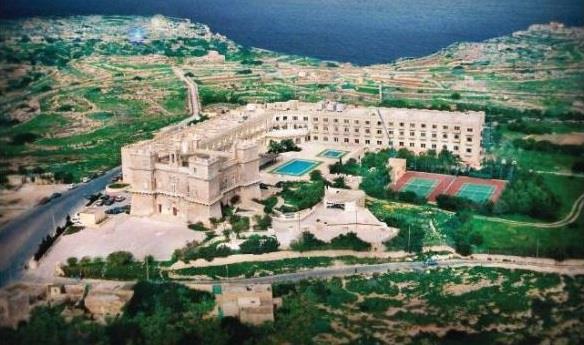
Selmun Palace Hotel
“What was important when it comes to Selmun Palace Hotel is that it will no longer be part of Air Malta. This is because the objectives of the restructuring process are that Air Malta keeps its core business. What is Air Malta? It is an airline, not a hotel operator. We need to respect this, so a few weeks ago we managed to close the transaction in which Selmun Palace was acquired by the government. We did it according to the rules of the EU, and respected the state aid rules. It was a transaction, in technical terms, done at arm’s length. Meaning everything was done by the book; it was also in line with the EU commission decisions in other cases. Procedurally, everything was done above board.
“Selmun Palace is a strategic asset in terms of the environment, we must respect the integrity of the area, and it is also a strategic asset for the niche markets of tourism which we may have not yet assessed. Possibly it could lead to a new niche. Yes, in the coming months the government will launch a competitive process, not to sell the property, but to allow concessions, because selling sounds like we are just going give it away to someone. That is not the case – there will be a competitive process where obviously the bidder with the best plan for Selmun Palace will be chosen.”
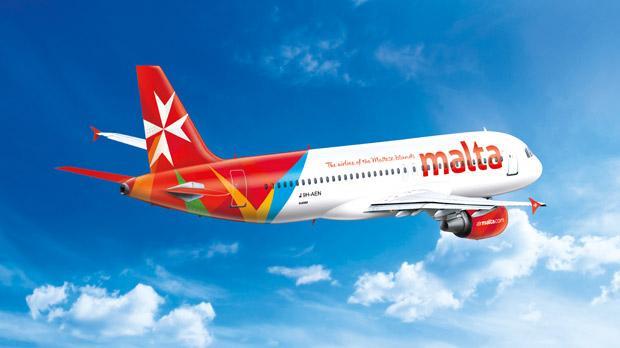
Air Malta
Announcements were made at the end of 2015 that the strategic partner of Air Malta would be announced. Asked about what happened to the announcements that were never made, he said: “The first thing we must consider is that Air Malta had a successful year in 2015. It was not easy because it is a small airline. It has roughly eight aircraft, and those familiar with the industry understand how small this airline is with just eight. In a competitive aviation industry where airlines are always consolidating, it can be tough. We were careful to have a viable business plan which will surpass 2015.
“We had two priorities – firstly, finding a strategic partner, but keeping in mind that Air Malta remains Air Malta. It is important to keep our brand name. It is part of our heritage, people are proud that they have Air Malta. The second thing is that we do not lose control of the airline. We didn’t want a strategic partner to avoid doing the changes that needed to be done. I have already said that the business plan that was in place was not working, is not working, and the status quo for the business model is unacceptable. It needed to be changed again, as the status quo is not an option for Air Malta.
“On the one hand we are carrying out the necessary changes, and on the other hand we need to reach the principle goals of the restructuring plan, which we agreed on with the government and the European Commission.
“Another important element was giving Air Malta a future, keeping it relevant. We felt that keeping the airline relevant does not mean simply throwing money at the problem. We already had two experiences of this, in 2004 and 2011 where the previous administrations threw money at it, without making the necessary changes to make it competitive. We ended up with the air line using the money but having no viability.
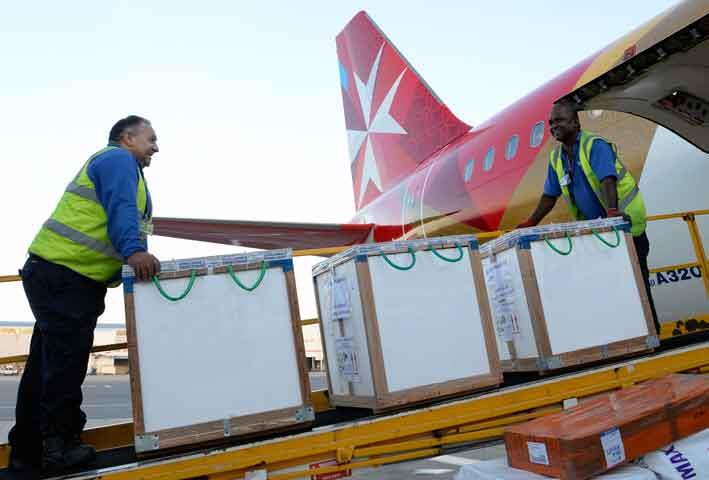
“We do not want to make the same mistake. We have negotiations that are still ongoing. We are not going to sell ourselves; we are still on track with negotiations. There were moments, in January, when certain declarations were made, so justifiably one would get the impression that negotiations were coming to a close. There were other moments were the momentum slowed down.
“Air Malta, with a strategic partner and without one still has to continue with its business plan; at the same time we need to select a strategic partner which will give us viability, and growth in the medium- and long-term. This is very important for the workers, as it provides opportunities for them. Air Malta has no other choice but to grow, it cannot remain as is or shrink.
“The business model needs to be changed to cater for this, including more routes, and more work opportunities, especially for Malta’s young people”.
Asked whether the Minister is on track with his planned timeline, he said: “If you are asking about timelines of the restructuring plan of the European Commission, we have reached our principle objectives. I need to thank a few people for the past two years; the chairperson, Maria Micallef, CEO Philip Micallef, the management, board of directors and the workers. We’ve heard of disagreements between the workers and management. And here I must thank the workers who were always responsible and never brought the company to its knees.
“When looking at the restructuring process we needed to question whether the company was able to stand on its own feet without state aid. Could it fend for itself as a commercial company? That is the big question, and that is why we need to change. We managed many of the objectives but we still need to press on to become an airline that is commercially viable. This is the bottom line for the European Commission.”
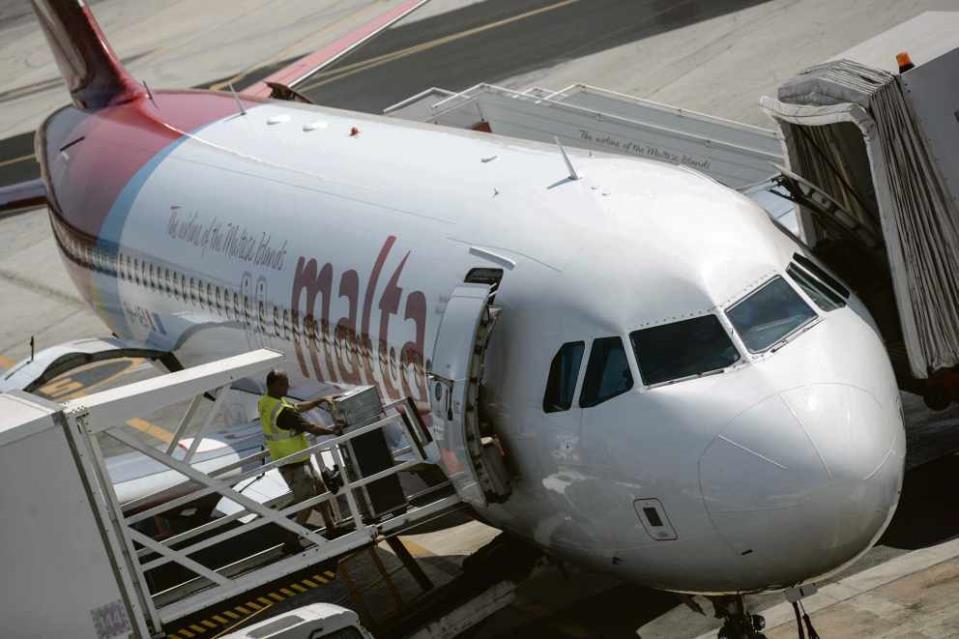
He added: “We need to observe the state-aid rules in a scrupulous way. We are in the EU, we believe in the principles and understand there will be repercussions if we do not follow these rules.”
“It is good to say, when looking at the last Annual General Meeting of Air Malta, that the objectives for the coming year are positive. Air Malta’s financial year is from March to March. The objectives we had, we reached. Are they enough? No, they are not enough. They are a step in the right direction.
“The airline’s commercial operations are improving. Marketing strategies have also improved, even the way Air Malta responded to the Brussels bombings. Within a few hours or minutes we changed the route to Dusseldorf and continued to offer our service. This shows an airline which is quick to respond to the exigencies which occur.
Referring to obstacles in place, Mr Zammit Lewis said, “We are not there yet, we still have challenges. I am determined not to do like the ones before me. I will not procrastinate, which leads nowhere and is no solution. The solution is tackling the problem head-on and developing a viable and relevant business plan: a plan with a strategic partner, which is in line with our objectives as an airline to move forward.”
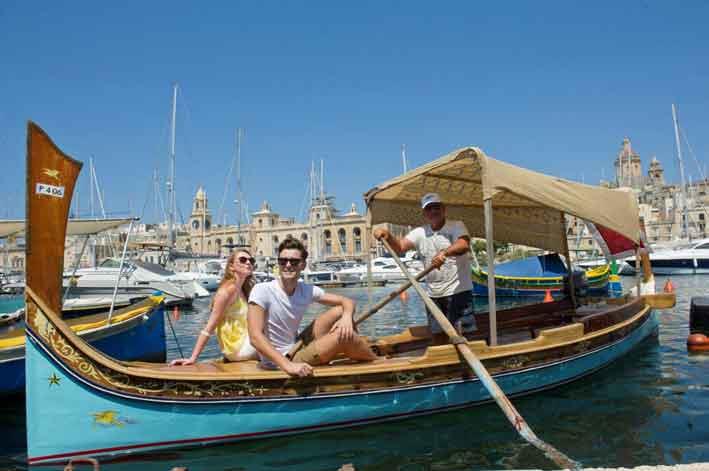
Tourism
Almost two million tourists visited the island in 2016. Asked about 2106 projections, Mr Zammit explained that there is not much room for growth in the summer months. The winter months however do have room for growth.
He said that the strategy has changed to “emphasise culture,” and the repositioning of Malta as a cultural destination. Rather than being just a sun, sand and sea destination, an effort is being made to be a Meetings, Incentives, Conferences and Exhibitions (MICE) destination. This strategy has given us excellent results so far.” He said January and February of this year exceeded expectations, adding that March too is having similar market reactions (without official statistics being published yet).
“So far all shoulder months are yielding excellent results.”
Turning to previous criticism about too many lower-income foreign students visiting the island, rather than more affluent ones, Mr Zammit Lewis quipped that whoever says this has absolutely no idea what they are talking about.
“We are breaking records in the cruise line industry. This year we are expecting 700,000 cruise line passengers, which would be another record. In 2015 we managed to do better than in 2012, which was our best year on record in the cruise line passenger traffic. In 2015, we had roughly 645,000. This is all important, as cruise line passengers helps the retail industry. Traditional tourists do not necessarily help the shops in Valletta or other localities. I repeat, we need to invest in niche markets.”
He said that when assessing the impact of tourists on the island from an expenditure point of view, it is a higher percentage than the number of arrivals, meaning that they are spending more money.
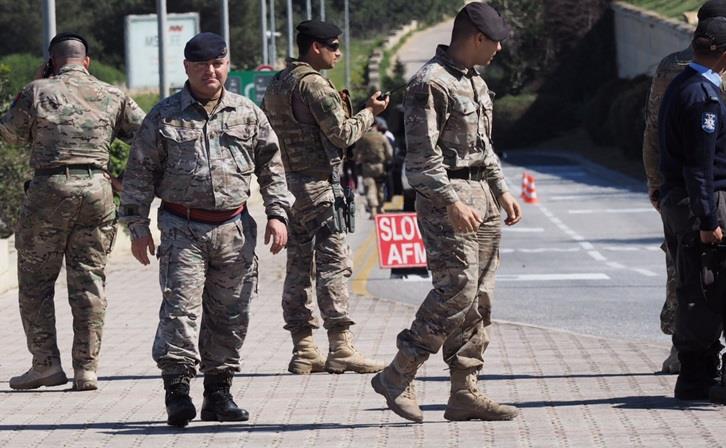
Terrorist attacks
Asked about whether there is concern of reduced airline passengers due to the recent spate of terrorist attacks, Mr Zammit Lewis said that when looking at the data it has not had an effect.
He went on to say that 98 per cent of Malta’s inbound and outbound traffic is through airports, and that the island’s safety and security has actually been a selling point.
“It’s certainly a threat and we are concerned. We have luckily been spared from such attacks.”
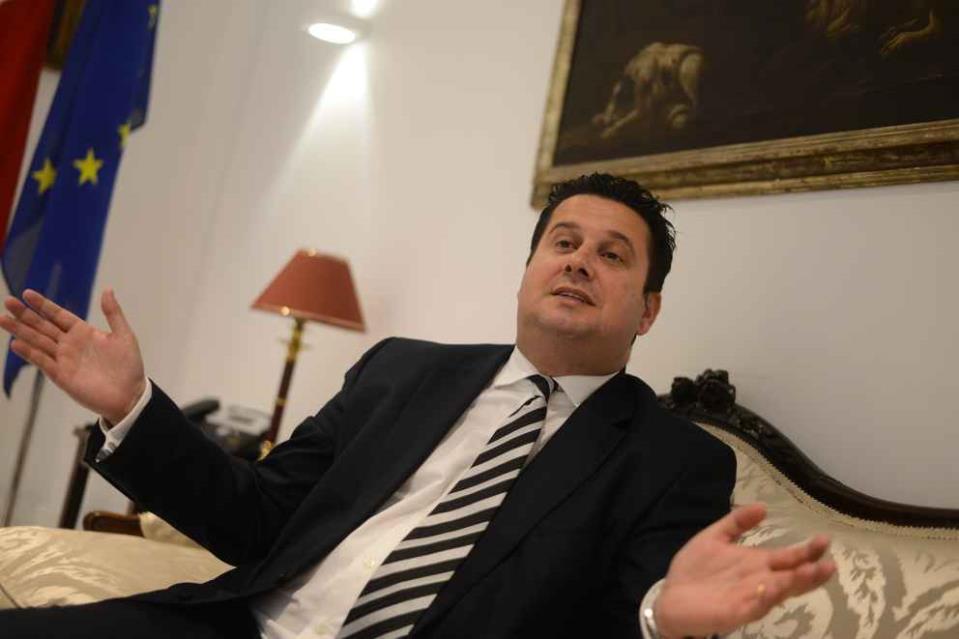
Air BnB
The Malta Hotels and Restaurant Association (MHRA) have spoken out against unlicensed private accommodation. These include private flats, rooms and houses rented out to tourists visiting a foreign country, which can be booked through services such as ‘Air BnB.’ Asked about his position on this, and whether the MHRA has been justified in its criticism, he said: “The market has changed and the type of accommodation has changed with it. Not everybody comes to Malta to stay in large hotels. The MHRA however has a point. Having licensed and unlicensed accommodation creates an uneven playing field, as those who have a licence play by the rules while those who are unlicensed do no. This is something that I, as a government Minister, cannot accept. The law says that everybody has to have a licence to offer accommodation. The licence is not seen as a source of revenue for the government. If you look at the fee charged, you will see that it is not very high. The point is that when trying to create a quality tourist destination, how can you regulate something that you do not know about? How can you regulate the standard of an accommodation when the very same competent authority, the MTA, which is in charge of issuing these licences, does not even know about the accommodation in the first place?
“So on two counts we have an issue, one, because of the uneven playing field and two, because we cannot safeguard our touristic project. We are not trying to stifle anybody; we want to regulate them, that’s all. The realities of tourism have changed, social media plays a big role, and tourists do not necessarily want to go to a hotel, we are not going to change European trends or world trends, not me or anyone else. We do need to regulate them, because when you do, you safeguard the product you give to tourists.”
Mr Zammit Lewis spoke of a conference he had attended recently where embracing digitisation was emphasised.
“We are not trying to regulate the market and oblige all tourists to go through operators. Forget that because this has changed. Instead, I have always stressed that everybody needs to invest in digital platforms because this is the world we are living in. As an authority that issues the licences, you have a stock of the country’s accommodation which remains unknown. We do not want to police the country when it comes to tourism, but to create a situation where we know what accommodation is available. MTA is there to help the operators, the ministry too. This is a time where we need more bed stock; we will help to improve their product and increase bed stock. We have no interest to close hotels, we want to help – obviously where rules are broken and the law abused, where the tourist has been offered a bad service, we need to show our teeth and enforce.
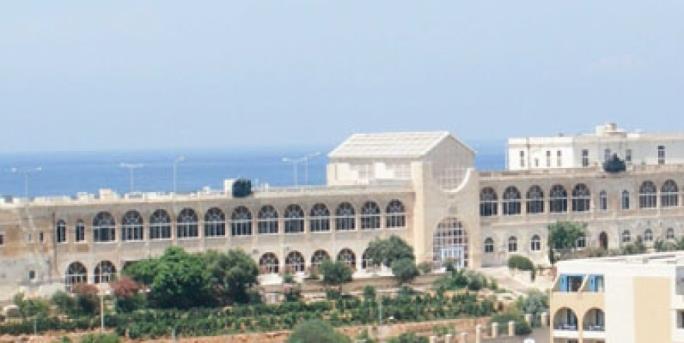
Institute for Tourism Studies
This week, a media report revealed that ITS had failed an EU quality assurance audit. Addressing the report, Mr Zammit Lewis said: “The ITS project started under previous administrations and is an important one. I believe that it is an important project for Malta. What happens, as time goes by, is that the model which the institute is operating under, does not necessarily remain relevant long-term. The world changes, hospitality changes, tourism changes – it is not just about waiters and receptionist. Now there is a plurality of jobs tied to tourism. We need to consider these, so we cannot any longer look at ITS as a food and beverage place.
“I found a situation that was deteriorating. A report explained that ITS did not pass the EU exams. We took action immediately, did an audit and are improving the curriculum right away. Teams I set up in the industry addressed certain gaps, ITS needs to respond to the exigencies of the industry. The Institute has been performing much better over the last year and we are trying to conclude partnerships in different areas and niches with big schools in the industry. The Haage Helia University of Applied Sciences, Finland, for example also specialises in training for ITS teachers. Trainers also need their skills updated as the industry changes. There was a take up of 20 teachers from ITS.
“This, to be clear, is not going to be the only partnership. We are going to continue entering into partnerships with the best hospitality schools in the world. Our target is to have more students graduating from ITS. It is a shame that we have a sector which is the strongest by far, that is performing so well but then we see a lack of investment in human capital.

“I am not here to just praise, I need to say where there is room for improvement. We are not matching the growth in human capital with success in the sector. This explains the foreign workers. We’re saying: let’s invest in human capital, let’s become a centre of excellence where foreign students can come, and invest more. This will lead to better conditions of work for workers because in certain sectors there’s much to be desired. We need more investment in our workers in this sector so that they benefit from the growth we’ve brought to the sector.
“We are not only trying to help the owners of restaurants and hotels, that’s up to them to a large extent, we are talking about benefits being felt by all in the sectors. At the moment, I am not totally content. Over the next two years, I will be working harder so that workers can really say they’ve felt the growth and benefits in this sector, and can say that ‘I’ve really had a piece of the pie too’.
“ITS is a priority for the upcoming year, and is supported by the project of slightly less than €60 million for which we have already started the application process. Apart from this, we will be taking up a number of initiatives, even with strategic partners, and we will be releasing news about this in the coming months.”

Panama Papers
Over the past seven weeks, Energy and Health Minister Konrad Mizzi together with the Prime Minister’s Chief of Staff Keith Schembri, were found to be in possession of secretive offshore financial structures. There is currently mounting pressure for both to resign, together with the Prime Minister himself. Days ago, the Opposition presented a motion for a vote of no confidence in Dr Muscat’s government.
Asked what he would do in Dr Mizzi’s position, Minister Zammit Lewis said that “obviously, this is a hypothetical question. I agree perfectly that this scandal has taken European and international proportions, so yes as a government minister I am preoccupied, especially regarding our financial sector – and for our image.
“When the financial services sector started in the 90s, it always had the Labour Party’s support even during the many years we were in Opposition. Yes, the situation worries me, from an international perspective.
“I am not Konrad Mizzi, so I cannot say what he should decide. I must say however, I never had, don’t have, and will never have a type of financial structure in Panama. I trust that the Prime Minister is listening to people, and without a doubt he has the prerogative to remove whoever from Cabinet. He is seeing the situation and will take the necessary steps. I associate myself with the majority of the public – which is concerned with the situation.
“I have continued with my work as normal – I have continued to work as hard as I can, I have remained focused. I am not perfect and mistakes happen, but hopefully the people will judge me on the positive results.
“I would have to be an idiot to think this situation does not have an effect on the country and the government. But without a doubt I am confident that the government will regain the trust of the people and regain the strength we had over the past three years. This situation does place a dark cloud on the positives things we’ve done, such as tourism and the economy.

Film
Addressing previous disappointments about famous actor Tom Cruise filming ‘The Mummy,’ in Malta, he said that “neither the film commissioner, nor the Ministry, had ever said Tom Cruise was going to shoot this film in Malta. It was announced that Mr Cruise was coming to Malta to consider the possibility of filming here. Unluckily we were not chosen, but we certainly do not put all our eggs in one basket. We have films which are high budget, which we should be announcing in the coming weeks and months.
“We are also working on popular TV series, which are not high-budget like Tom Cruise, Angelina Jolie, Brad Pitt and 13 hours, but have a certain consistency because they come for a longer period. The work doesn’t stop here. The film commissioner is always working around the clock to bring more positivity. Obviously, he was not happy about that news but we need to keep working, as there are many opportunities.”